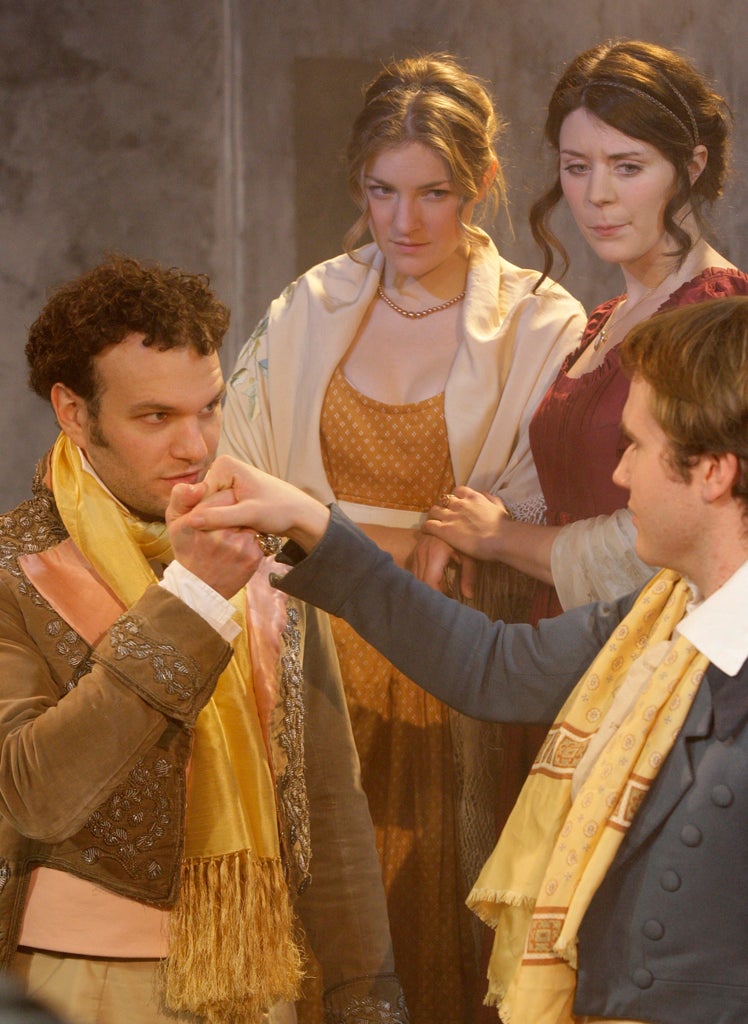
The hotel on the other side of Lake Geneva cashed in on the delicious shamelessness of it. They hired out binoculars so that tourists could gawp pruriently at the Villa Diodati and its scandalous summer menage of the Shelleys; the "mad, bad, and dangerous to know" Byron, and Claire Clairmont, Mary Shelley's half-sister, who had slept with both poets and was carrying Byron's baby.
Exiles from a Britain that had deprived them of a public political outlet, they had turned their focus inward on a "new experiment in living". Free love, though, always comes at a price, with women generally having to pick up the bill. This sojourn in 1816, and its aftermath, are the focus of Howard Brenton's bold, freewheeling play 1984 Bloody Poetry, which is revived now by Tom Littler in a production which does richly textured justice both to its rumbustious comedy and its sensitive insights into the tragic existential predicament of this second generation of Romantics.
Beautifully scaled to the intimate dimensions of the Jermyn Street Theatre, Will Reynolds's excellent design imposes a strong imaginative unity on a play that darts about from the Alps, via Geneva and Venice, to the beach in the Bay of Spezia were Shelley's drowned body is climactically burned. On a wall of smudgily mottled pale blue and black, the various locales are summoned up throughout in a series of concentrated letter-box-shaped projections of lapping light or wonderfully evocative old black and white photographs. Down below is a trough of water where the ghost of Shelley's first wife Harriet (who committed suicide in the Serpentine) accusatorily trudges, emblematising all the human casualties of this daring but Utopian project. Snatches from a late Beethoven string quartet compound a sense of brooding, exacerbated spirits.
Nick Trumble is excellent as Byron's physician Polidori, an envious little squirt who had a secret contract to gather tittle-tattle for book publication. The fact that this Schadenfreude-merchant acts as the play's MC is disarming. He dines out on the quartet's dismay, so to speak, in perpetuity - which inclines us to look more sympathetically on their own conscious myth-making. Thanks to some fine performances here, we feel the pain as well as the preposterousness of posturing in the light of imagined posterity, of wanting to be examplary pioneers only to be made an example of. David Sturzaker seems to have been instructed to boom with incipiently Brian Blessed-like overtones in a misguided, over-hearty reading of Byron, but Rhiannon Sommers gives a wonderfully intelligent account of the torn feelings of Mary Shelley and it is a great tribute to Joe Bannister's baby-faced Shelley, who always looks as though he has just been freshly unwrapped, that you fully believe, when he gives it a thrilling eleventh hour rendition, that he wrote the mighty "Mask of Anarchy". Warmly recommended.
To 25 February
Subscribe to Independent Premium to bookmark this article
Want to bookmark your favourite articles and stories to read or reference later? Start your Independent Premium subscription today.

Join our commenting forum
Join thought-provoking conversations, follow other Independent readers and see their replies